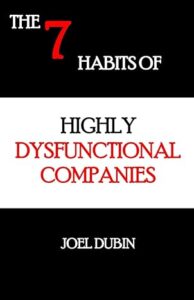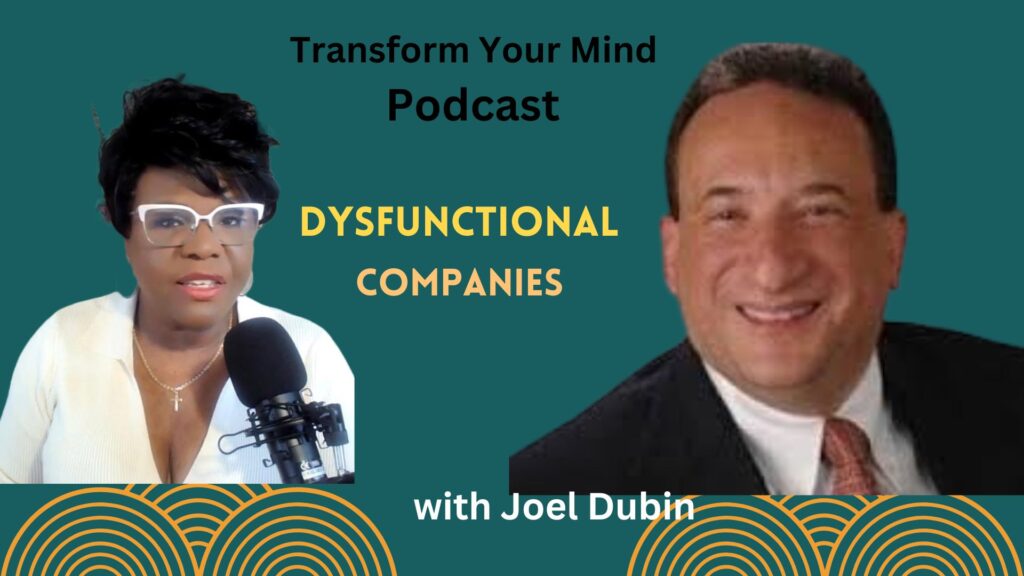Joel Dubin, retired cyber security consultant and humor author, joins life coach Myrna Young to discuss his book, “The Seven Habits of Highly Dysfunctional Companies.” They delve into corporate hilarity, exploring nonsensical policies, office politics, excessive emails, and poor employee treatment. Featuring concepts like Calculating the Asshole Density Ratio and the role of ineffective communication, Joel offers insights and humor about navigating corporate chaos in dysfunctional companies. Perfect for anyone in the corporate world seeking a light-hearted yet insightful take on improving workplace dysfunction.
Download the podcast here:
Key Takeaways:
Understanding Corporate Dysfunction: Joel Dubin highlights key dysfunctions within companies including nonsensical policies, excessive meetings, and poor communication which foster toxic workplaces.
Humor as a Coping Mechanism: Through humor, employees can navigate and cope with the frustrations of working in dysfunctional environments.
Actionable Solutions: Practical advice such as limiting after-hours emails and improving leadership visibility can mitigate corporate dysfunction.
Identifying Common Traits in Dysfunctional Companies
Joel Dubin, a retired cyber security consultant and author of “The Seven Habits of Highly Dysfunctional Companies,” draws from his decades-long experience in corporate environments to share insights on what makes companies dysfunctional. During his conversation with Myrna Young on her podcast, Dubin outlined several pervasive issues he observed, providing a humorous yet poignant examination of dysfunctional companies in corporate America.
One of the major dysfunctions discussed is the persistence of nonsensical policies and excessive email communication. Dubin notes that employees often find themselves bogged down, not by productive work, but by a deluge of redundant and unnecessary emails. According to Dubin, “you walk in the office in the morning, you got all these emails…half of which are nonsense.” This impedes real work and increases workplace stress, particularly with the advent of constant connectivity, where employees receive work-related emails even late at night, disrupting personal time.
Another significant issue is the proliferation of pointless meetings. Dubin humorously describes employees being constantly pulled into meetings by what he calls “meeting police,” whose sole job seems to be ensuring everyone is stuck in a room discussing irrelevant matters rather than working. He jokes, “if someone sent an email after five o’clock he would discipline them…you get emails at 10 o’clock…but yeah, the key thing is just that a lot of these companies are very bureaucratic.”
To mitigate these dysfunctions, Dubin suggests cutting down on after-hours communication and limiting unnecessary vertical and horizontal communication disturbances within an organization.

The Value of Humor in Navigating Corporate Life
Dubin’s use of humor in the face of corporate dysfunction is not just a stylistic choice but a therapeutic one. Throughout the podcast, he underscores how laughter can serve as a coping mechanism for those stuck in frustrating corporate environments. For instance, when discussing the concept of the Asshole Density Ratio (ADR)—a metric he humorously proposes to measure the concentration of troublesome individuals in a company—Dubin says, “that’s the number of asses per square mile per square foot within the company.”
Humor allows employees to distance themselves from daily irritations and view their situations from a lighter perspective. This can often be a form of psychological relief, making the work environment slightly more bearable. Dubin’s sarcastic take on management practices and corporate jargon, like “performance Improvement program” or “corp speak,” highlights how out-of-touch executives can be and how this often manifests in nonsensical corporate practices.
Humor, therefore, not only serves to critique but also to connect employees who might feel isolated in their frustrations. It’s a tool for fostering a sense of solidarity and mutual understanding among co-workers.

Practical Solutions to Reduce Corporate Dysfunction
Though heavy on humor, Dubin’s insights also provide actionable advice for reducing dysfunction within companies. One critical area he emphasizes is improving management’s engagement with staff. Dubin criticizes the isolation of executives who reside in “Ivory Towers” and suggests that management should be more accessible and visible to employees. He states, “isolated and out-of-touch management wonder why they can’t get ahead,” emphasizing the importance of management being in touch with ground-level operations.
Another solution for dysfunctional companies lies in revising hiring practices to identify and address poor fits early on. Dubin bemoans the automated systems that filter resumes without nuance, leading to poor hiring decisions. He advocates for networking and using alumni associations and professional organizations to find suitable candidates, arguing that personal connections often yield better results than automated processes.
By addressing these issues—improving communication, balancing leadership visibility, and refining hiring processes—companies can begin to tackle some of the root causes of dysfunctional companies as highlighted in Dubin’s book.

Reflections on Dysfunctional Companies
Joel Dubin’s insights offer both a humorous and critical look at the internal workings of corporate environments. He paints a vivid picture of the common dysfunctions that plague dysfunctional companies, from bureaucratic red tape to ineffective communication practices. While his humor provides a much-needed outlet for employees grappling with these challenges, his practical solutions offer a pathway towards healthier workplace dynamics.
Dubin’s emphasis on improving management’s accessibility, revising hiring practices, and fostering better internal communication presents a roadmap for companies aiming to minimize dysfunction. These strategies, if implemented, could lead to more efficient, cohesive, and ultimately successful corporate environments. His final thoughts urge employees and managers alike to recognize these dysfunctions and work towards mitigating them for a healthier, more productive work atmosphere.






